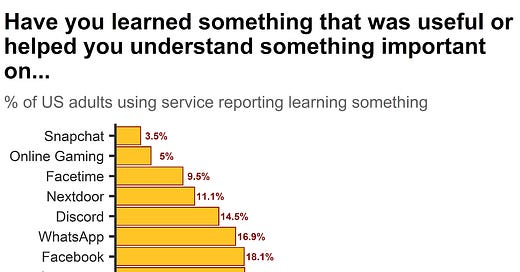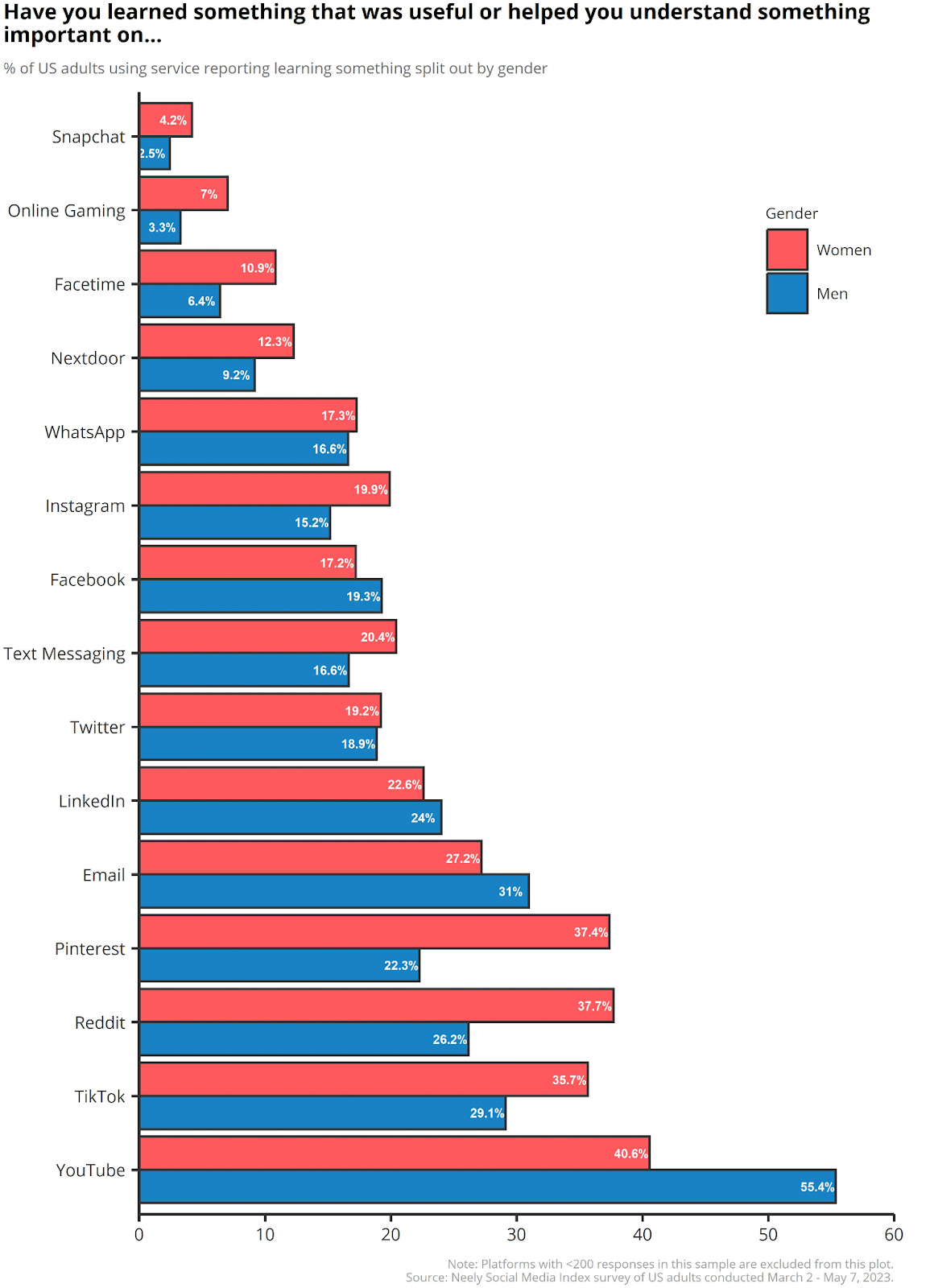In the past month, we’ve introduced the Neely Social Media Index and reported our findings for social media experiences that users perceived as bad for the world, and experiences that negatively affected users personally. Yet, we aim to provide a balanced approach and provide insight into some of the many benefits of social media. Therefore, in today’s post, we shift our focus to one of two positive experiences that users may have when using social media and online communication services.
Throughout history, technology has changed the way people learn, and generally in the direction of greater decentralization and distribution. Prior to the printing press, manuscripts were expensive to reproduce and few had access to them, or to their authors. Much like radio, television, and other other media innovations, social media made it substantially easier for most people in most places around the world to both share and obtain information. This has many ramifications that we will discuss in the future, but this report focuses just on the question of what social media outlets are most likely to help its users learn something that was useful or understand something important.
YouTube topped the list with 47.9% of U.S. adults who use it reporting having learned something significant or gaining important understanding from the platform, an indication of the high educational value people derive from this video-based service. Following was Pinterest, with 34.7% of users reporting beneficial learning experiences.
TikTok was next with 33.2% of users stating they had gained valuable knowledge or understanding from the platform. Reddit, the discussion and community-driven site, also proved to be a significant source of learning, with 30.3% of users reporting meaningful knowledge acquisition.
To contextualize these numbers, email was reported by 29.1% of users as a source of important knowledge or understanding. On the lower end of the spectrum were Snapchat and Nextdoor. Despite their popularity, only 3.5% and 11.1% of users, respectively, reported learning something useful or gaining important understanding from these platforms.
This analysis is informative in giving a general rank ordering of the social media and communication services where users report the highest and lowest likelihoods of learning something helpful or important. Yet, it is a simple top-level summary that may vary across different types of users. Unlike our previous blog posts on questions related to negative experiences, we did not ask respondents about the topics and impacts of their experiences on them. We did, however, allow them to describe what they learned.
In these open-ended descriptions there is considerable variability in what users claim to have learned that was useful and/or important on these platforms. YouTube displayed the widest range of topics, but our respondents typically said they learned how to do something. The specifics of what they learned varied widely from how to cook a meal, fix a car, do one’s hair, exercise, interpret religious scripture, and much more. A sizable portion of YouTube users also indicated learning useful things from documentaries and edutainment shows (e.g., The John Oliver Show, TED Talks).
TikTok users described that what they learned that was important or useful could be described as “hacks,” including life hacks, teaching hacks, phone hacks, and car maintenance hacks. A fair number of TikTok users also reported learning about current events and society through the platform. One such user stated that they “learned way more about my government on TikTok than I ever had in school.”
Pinterest users generally mentioned learning useful crafts, recipes, and beauty tips. Reddit and Facebook users described learning things related primarily to news, politics, and current events.
Most responses regarding what people learned on email pertained to work, like “what time was a meeting?” and , “who is responsible for what?” Another cluster of responses pointed to intentional learning via email, by referring to emailing with teachers and professors asking for help with an assignment. Text message users report learning important information regarding friends and family, and how to coordinate with others (e.g., when particular events are happening, where people are meeting, etc.).
In the subsequent sections, we look at whether self-reported learning on these platforms varies by gender, politics, age, education, and race/ethnicity.
Gender
We recognize that gender is a multifaceted, complex identity. Yet, less than 1% of our sample reported a gender other than Man or Woman. Therefore, our analysis is limited to self-identified men and women, as we have an insufficient number of respondents with a gender different from those two categories to generate a stable, reliable point estimate.
In the bar chart below, we see the same general rank-ordering of the social platforms, but some differences between men and women. Numerically speaking, women reported learning something useful or important more often than men on all platforms except for YouTube and Email. Men reported learning something important at a significantly higher rate than women on YouTube, and at a marginally higher rate on email than did women. On the other hand, women reported learning significantly more than men on Discord and Pinterest, and marginally more on TikTok, Facetime, Instagram, text messaging, and Reddit.
Politics
To examine political differences, we adopted a standard procedure from political science whereby we create groups of people based on whether they claim membership in a certain party or they claim to be independent even though they typically vote for one party. This is important to do because many independents are not actually independents, but rather people who have a party preference but opt not to or are ineligible to register for a party (for more detail on this interesting phenomenon, see this paper). We’ve also opted to exclude people who identified as members of other parties because they comprised just 4% of the sample and point estimates for that subgroup would likely be misleading.
Republicans, including independents who tend to vote for Republicans, report more learning experiences on YouTube than Democrats and Independents. Democrats, including Independents who tend to vote for Democrats, report more learning experiences on YouTube than Independents. Democrats also report learning at a significantly higher rate on Reddit than do Republicans and Independents.
Otherwise, there were no reliable significant differences between these political persuasions across platforms. This does not rule out the possibility that small differences of potential importance do not exist, just that we are not able to detect them given the sample size our budget permits us to when segmented down by subgroups of people across platforms (especially lesser-used platforms).
Age
Generally, older people reported learning something useful at a higher rate than younger cohorts. The only exceptions to this tendency are Instagram, TikTok, and online gaming.
The youngest cohort in our sample, 18-29 year olds, reported learning something useful at a higher rate on TikTok than on any other platform. And, 45-59 year olds report learning something useful or important at a higher rate on LinkedIn than younger age groups.
Education
People with higher education levels generally displayed the highest rates of learning something useful or important across most platforms. The only exceptions to this tendency were WhatsApp, TikTok, and Snapchat, where they were on par with people who have a high school or lower level of education. The most stark distinction can be seen on email, where people with college or postgraduate degrees (42.7%) report learning something useful or important 2.87x more than people with a high school or less level of education (14.7%).
Race/Ethnicity
To examine potential race and ethnicity differences, we asked people to report their races and ethnicities, and combined responses to those two questions to form the recommended race/ethnicity composite variable. 5% of our sample selected “other” or multiple races, which is too small for that heterogeneous group to yield a reliable point estimate across platforms, and are excluded from these analyses.
White, non-Hispanic people reported the highest rates of learning something useful or important on Facetime, Twitter, text messaging, Pinterest, Reddit, and WhatsApp. Asian, non-Hispanic people reported the highest rates on YouTube, TikTok, email, and online gaming. Hispanic people reported the highest rate of learning something useful or important on LinkedIn, and Black, non-Hispanic people reported learning something useful or important at a slightly higher rate on Facebook than did people from other racial/ethnic groups.
In Summary
US adults report learning something useful or important on YouTube at a significantly higher rate than all other platforms. There is some subgroup variability where the more educated, men, non-Hispanic Asian people, and Republicans report higher rates of learning on YouTube than their cohort counterparts, but generally YouTube has the highest rate of users reporting learning something useful or important. Older, more educated, and people who identify as women tend to report learning at a higher rate than other subgroups do. Additionally, Snapchat and online gaming platforms tend to have the lowest report rates of learning something useful or important, mostly regardless of the characteristics of their users.
In one of our next posts, we will explore whether users of different social media platforms are more or less likely to experience meaningful connections with others, and how this may vary by demographic characteristics.
For more like this, please consider subscribing to our blog.
Note: To see the detailed sample sizes and margins of error for the demographic subgroups discussed in the above analyses, you may find them on this Google spreadsheet.









